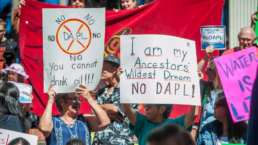A court’s decision against Greenpeace threatens all activist organizations.
By David Helvarg, The Progressive
If you remember the Standing Rock protest encampment against the Dakota Access Pipeline, which lasted from 2016 into 2017 and was met with a harsh winter of political suppression, you might also remember that the movement was visibly and powerfully led by Indigenous water protectors from the Sioux tribe.
These protests—which remained largely non-violent in the face of hostile local law enforcement and corporate-hired “private security”—were led by the Standing Rock Sioux, whose lands and treaty rights were endangered by the pipeline. The federal government approved the pipeline route without adequately consulting tribal members, in violation of the tribe’s treaty rights.
The protests drew thousands of Native Americans, inspired Indigenous youth and other supporters (including Robert F. Kennedy Jr.) and set off a revival of Indigenous empowerment in the United States that has carried through the COVID-19 pandemic—when many reservations closed access to outsiders as a protective measure—and on to today. We’re now in the midst of increased visibility for Indigenous art, films, culture, television shows, reclamation, as well as a push for emerging political leadership and co-management of lands and waters within the Native American community. This included, under the Biden Administration, the first Indigenous Secretary of Interior, Deb Haaland, and the first Alaska Native elected to Congress, Mary Peltola.

But in spite of this groundswell of Indigenous activism, a North Dakota jury decided on March 19 that the environmental and climate action group Greenpeace should pay more than $660 million for damages and defamation to Energy Transfer LP, a Texas-based pipeline company that completed the Dakota Access Pipeline pipeline in 2017. Energy Transfer, whose CEO was a major supporter of President Donald Trump’s 2024 campaign, claims that Greenpeace agitated against the completion of the crude oil pipeline by paying and training protestors, as well as providing them supplies to form a blockade.
It’s hard to believe that, in the midst of the global climate emergency and decades-long disinformation campaign surrounding it, anyone can actually defame the fossil fuel industry. It would be like Vladimir Putin suing Alexei Navalny’s family for defaming him by saying Navalny was murdered in prison.
Greenpeace, of course, does not have hundreds of millions in spare cash to pay out. But the aim of this successful legal action, known as a Strategic Lawsuit Against Public Participation (SLAPP) suit, has less to do with enriching the nation’s largest pipeline company, which generated more than $82 billion in revenue last year, than with suppressing voices of dissent.
Recent Posts
“Arrest Now, Ask Questions Later”: Why Did L.A. ICE Agents Arrest and Jail U.S. Citizen Andrea Velez?
July 3, 2025
Take Action Now “They didn’t have vests that said ICE or anything. Their cars didn’t have license plates. … Just because of the color of our…
Trump’s Big, Beautiful Bill Is Naked Class War
July 3, 2025
Take Action Now Trump’s “Big, Beautiful Bill” trades tax cuts on millionaires for the dissolution of society.By Hamilton Nolan, In These Times…
Mayor Mamdani’s First Day, A Zero Hour Conversation With Richard Wolff
July 2, 2025
Take Action Now If elected, what would Mayor Mamdani do on his first day in City Hall? How would a democratic socialist govern as a big-city mayor?……
The U.S. Is Funding A Bloodbath At Gaza Aid Centers
July 2, 2025
Take Action Now The admin just gave $30M to GHF, the organization at the center of charges that Israel is weaponizing assistance and shooting at…




